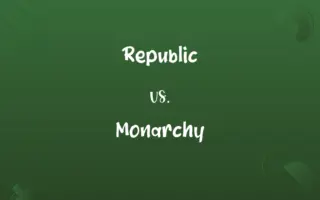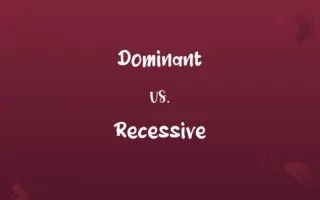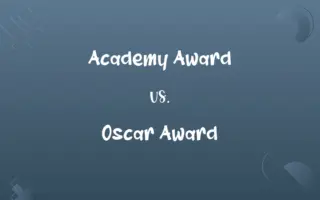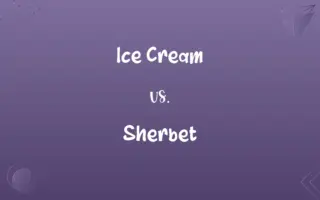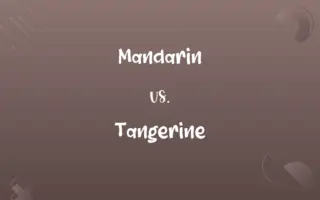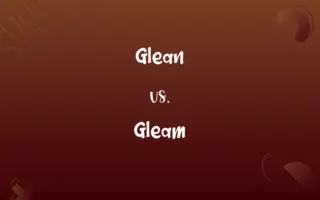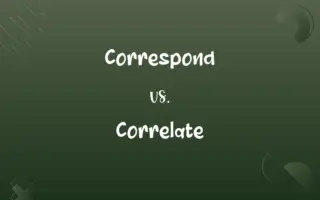Atom vs. Molecule: Know the Difference

By Shumaila Saeed || Updated on December 25, 2023
An atom is the smallest unit of an element, indivisible by chemical means, while a molecule is a group of atoms bonded together, representing the smallest unit of a chemical compound.
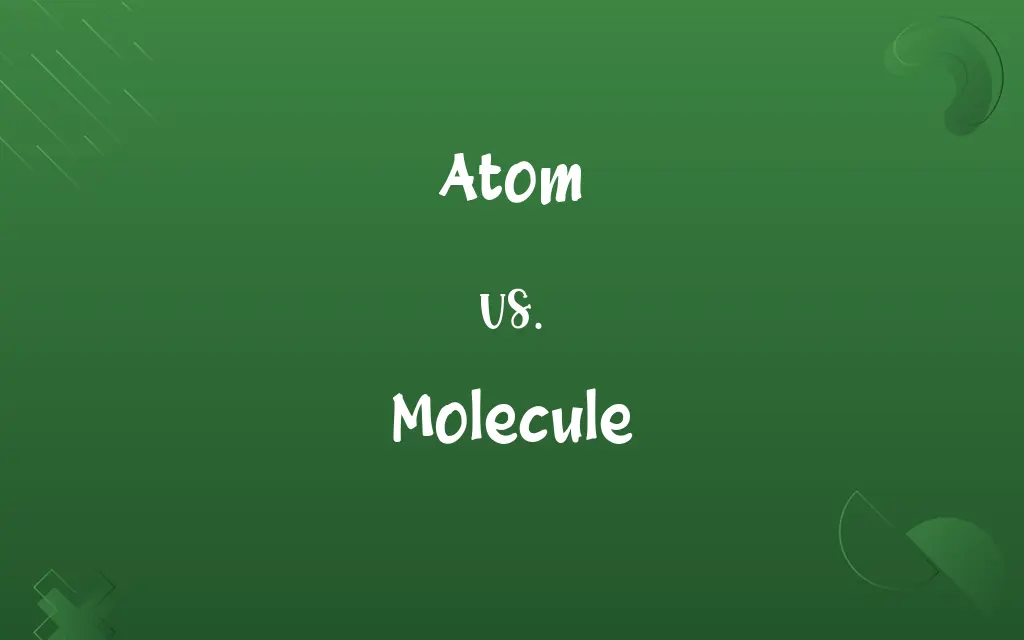
Key Differences
An atom is the fundamental building block of matter, consisting of a nucleus surrounded by electrons. It's the smallest unit of an element that retains its chemical properties. In contrast, a molecule is a chemical structure that consists of two or more atoms bonded together. Molecules represent the smallest identifiable unit of a chemical compound, maintaining its chemical properties.
Shumaila Saeed
Nov 16, 2023
Atoms are characterized by their specific number of protons, neutrons, and electrons, determining their place in the periodic table. Each atom has a unique atomic number representing the number of protons in its nucleus. Molecules, however, are formed when atoms of the same or different elements share or transfer electrons, creating chemical bonds. These bonds hold the atoms together, forming a stable structure.
Shumaila Saeed
Nov 16, 2023
The behavior of atoms and molecules dictates the nature of chemical reactions. Atoms can undergo reactions to form molecules, and these molecules can further react with other atoms or molecules. While atoms are often considered the basic unit for studying chemical elements, molecules are central to studying chemical compounds and their reactions.
Shumaila Saeed
Nov 16, 2023
In terms of physical properties, atoms can exist independently in some cases, like noble gases. However, molecules, due to their combined nature, often have different physical and chemical properties compared to their constituent atoms. This difference is crucial in understanding chemical processes and the formation of various substances.
Shumaila Saeed
Nov 16, 2023
Finally, the study of atoms and molecules is fundamental to understanding the broader concepts in chemistry. Atoms give insight into the elemental nature of matter, while molecules provide a deeper understanding of chemical compounds, their structures, and interactions.
Shumaila Saeed
Nov 16, 2023
ADVERTISEMENT
Comparison Chart
Physical Presence
Can exist independently in some cases
Always a combination of atoms
Shumaila Saeed
Nov 16, 2023
Role in Chemistry
Basic unit for studying elements
Basic unit for studying compounds
Shumaila Saeed
Nov 16, 2023
Chemical Properties
Defined by atomic number and electron configuration
Determined by the type and arrangement of bonded atoms
Shumaila Saeed
Nov 16, 2023
Examples
Helium atom, Carbon atom
Water molecule (H2O), Carbon Dioxide molecule (CO2)
Shumaila Saeed
Nov 16, 2023
ADVERTISEMENT
Atom and Molecule Definitions
Atom
Atom: Distinguished by its atomic number.
An oxygen atom, with an atomic number of 8, has eight protons.
Shumaila Saeed
Nov 16, 2023
Molecule
Molecule: Maintains chemical properties of its compound.
Each carbon dioxide molecule contributes to the greenhouse effect.
Shumaila Saeed
Nov 16, 2023
Atom
Atom: Can exist independently or as part of a molecule.
Argon atoms exist independently in the atmosphere.
Shumaila Saeed
Nov 16, 2023
Molecule
Molecule: Can participate in chemical reactions.
Oxygen molecules are vital for combustion reactions.
Shumaila Saeed
Nov 16, 2023
Atom
Atom: Characterized by a nucleus surrounded by electrons.
The hydrogen atom consists of one proton and one electron.
Shumaila Saeed
Nov 16, 2023
ADVERTISEMENT
Molecule
Molecule: The smallest unit of a chemical compound.
A molecule of glucose is essential for cellular respiration.
Shumaila Saeed
Nov 16, 2023
Atom
A part or particle considered to be an irreducible constituent of a specified system.
Shumaila Saeed
Oct 19, 2023
Molecule
Molecule: Can exhibit molecular bonding like ionic or covalent.
Sodium chloride forms a molecule through ionic bonding.
Shumaila Saeed
Nov 16, 2023
Atom
The irreducible, indestructible material unit postulated by ancient atomism.
Shumaila Saeed
Oct 19, 2023
Molecule
Molecule: A group of atoms bonded together.
A water molecule is composed of two hydrogen atoms and one oxygen atom.
Shumaila Saeed
Nov 16, 2023
Molecule
The smallest particle of a substance that retains the chemical and physical properties of the substance and is composed of two or more atoms; a group of like or different atoms held together by chemical forces.
Shumaila Saeed
Oct 19, 2023
Atom
The smallest unit of an element, having all the characteristics of that element and consisting of a very small and dense central nucleus containing protons and neutrons, surrounded by one or more shells of orbiting electrons. Atoms remain undivided in chemical reactions except for the donation, acceptance, or exchange of valence electrons.
Shumaila Saeed
Oct 19, 2023
Molecule
(chemistry) The smallest particle of a specific element or compound that retains the chemical properties of that element or compound; two or more atoms held together by chemical bonds.
Hydrogen chloride is a diatomic molecule, consisting of a hydrogen atom and a chlorine atom.
Shumaila Saeed
Oct 19, 2023
Atom
The smallest possible amount of matter which still retains its identity as a chemical element, now known to consist of a nucleus surrounded by electrons.
Shumaila Saeed
Oct 19, 2023
Atom
(history of science) A hypothetical particle posited by Greek philosophers as an ultimate and indivisible component of matter.
Shumaila Saeed
Oct 19, 2023
Molecule
One of the very small invisible particles of which all ordinary matter is supposed to consist.
Shumaila Saeed
Oct 19, 2023
Molecule
The smallest part of any substance which possesses the characteristic properties and qualities of that substance, and which can exist alone in a free state.
Shumaila Saeed
Oct 19, 2023
Atom
(philosophy) In logical atomism, a fundamental fact that cannot be further broken down.
Shumaila Saeed
Oct 19, 2023
Molecule
A group of atoms so united and combined by chemical affinity that they form a complete, integrated whole, being the smallest portion of any particular compound that can exist in a free state; as, a molecule of water consists of two atoms of hydrogen and one of oxygen. Cf. Atom.
Shumaila Saeed
Oct 19, 2023
Atom
(historical) The smallest medieval unit of time, equal to fifteen ninety-fourths of a second.
Shumaila Saeed
Oct 19, 2023
Molecule
(physics and chemistry) the simplest structural unit of an element or compound
Shumaila Saeed
Oct 19, 2023
Atom
(mathematics) A non-zero member of a partially ordered set that has only zero below it (assuming that the poset has a least element, its "zero").
In a Venn diagram, an atom is depicted as an area circumscribed by lines but not cut by any line.
Shumaila Saeed
Oct 19, 2023
Atom
The smallest particle of matter that can enter into combination; one of the elementary constituents of a molecule.
Shumaila Saeed
Oct 19, 2023
Atom
Anything extremely small; a particle; a whit.
There was not an atom of water.
Shumaila Saeed
Oct 19, 2023
Atom
(physics and chemistry) the smallest component of an element having the chemical properties of the element
Shumaila Saeed
Oct 19, 2023
Atom
Atom: The smallest unit of a chemical element.
A helium atom remains unreactive due to its complete outer electron shell.
Shumaila Saeed
Nov 16, 2023
Atom
Atom: A source of nuclear energy when split or fused.
The splitting of uranium atoms releases a tremendous amount of energy.
Shumaila Saeed
Nov 16, 2023
Repeatedly Asked Queries
What is a molecule?
A molecule is a group of atoms bonded together, representing the smallest unit of a chemical compound.
Shumaila Saeed
Nov 16, 2023
What holds atoms together in a molecule?
Chemical bonds, like covalent or ionic bonds, hold atoms together in a molecule.
Shumaila Saeed
Nov 16, 2023
Can atoms exist independently?
Yes, some atoms like noble gases can exist independently.
Shumaila Saeed
Nov 16, 2023
What's the difference between a molecule and a compound?
A molecule is a group of atoms bonded together, while a compound is a substance formed when two or more elements are chemically bonded.
Shumaila Saeed
Nov 16, 2023
What is an atom?
An atom is the smallest unit of an element that maintains its chemical properties.
Shumaila Saeed
Nov 16, 2023
Are all molecules made of multiple elements?
No, molecules like O2 (oxygen) consist of atoms from the same element.
Shumaila Saeed
Nov 16, 2023
Are all molecules stable?
Not all molecules are stable; some are reactive and prone to chemical changes.
Shumaila Saeed
Nov 16, 2023
How are atoms identified?
Atoms are identified by their atomic number, which is the number of protons in the nucleus.
Shumaila Saeed
Nov 16, 2023
Can molecules be broken down into simpler substances?
Molecules can be broken down into their constituent atoms through chemical reactions.
Shumaila Saeed
Nov 16, 2023
Do atoms have a charge?
Atoms are electrically neutral, with equal numbers of protons and electrons.
Shumaila Saeed
Nov 16, 2023
Do molecules have specific shapes?
Yes, molecules have specific geometric shapes determined by the arrangement of atoms.
Shumaila Saeed
Nov 16, 2023
How do atoms become ions?
Atoms become ions by gaining or losing electrons.
Shumaila Saeed
Nov 16, 2023
What is isotopes in context of atoms?
Isotopes are atoms of the same element with different numbers of neutrons.
Shumaila Saeed
Nov 16, 2023
What is a valence electron?
A valence electron is an electron in the outer shell of an atom that can participate in forming chemical bonds.
Shumaila Saeed
Nov 16, 2023
What's a molecular formula?
A molecular formula shows the number and type of atoms in a molecule.
Shumaila Saeed
Nov 16, 2023
Can molecules be seen with a microscope?
Some molecules can be observed with advanced microscopes like electron microscopes.
Shumaila Saeed
Nov 16, 2023
Can molecules have electric charges?
Yes, ionic molecules can carry an electric charge.
Shumaila Saeed
Nov 16, 2023
What's the role of electrons in an atom?
Electrons determine the chemical behavior of an atom.
Shumaila Saeed
Nov 16, 2023
Can the number of protons in an atom change?
No, changing the number of protons would change the element itself.
Shumaila Saeed
Nov 16, 2023
Share this page
Link for your blog / website
HTML
Link to share via messenger
About Author
Written by
Shumaila SaeedShumaila Saeed, an expert content creator with 6 years of experience, specializes in distilling complex topics into easily digestible comparisons, shining a light on the nuances that both inform and educate readers with clarity and accuracy.
